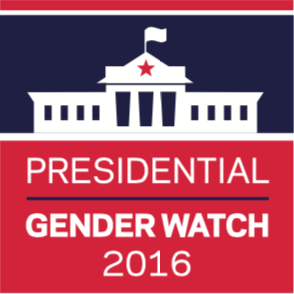Embracing Gender: It’s Debatable
 In April 2015, the Barbara Lee Family Foundation (BLFF) and the Center for American Women and Politics (CAWP) launched Presidential Gender Watch 2016, a project to track, analyze, and illuminate gender dynamics in the 2016 presidential election. With the help of expert scholars and practitioners, Presidential Gender Watch worked for 21 months to further public understanding of how gender influences candidate strategy, voter engagement and expectations, media coverage, and electoral outcomes in campaigns for the nation’s highest executive office. The blog below was written for Presidential Gender Watch 2016, as part of our collective effort to raise questions, suggest answers, and complicate popular discussions about gender’s role in the presidential race.
In April 2015, the Barbara Lee Family Foundation (BLFF) and the Center for American Women and Politics (CAWP) launched Presidential Gender Watch 2016, a project to track, analyze, and illuminate gender dynamics in the 2016 presidential election. With the help of expert scholars and practitioners, Presidential Gender Watch worked for 21 months to further public understanding of how gender influences candidate strategy, voter engagement and expectations, media coverage, and electoral outcomes in campaigns for the nation’s highest executive office. The blog below was written for Presidential Gender Watch 2016, as part of our collective effort to raise questions, suggest answers, and complicate popular discussions about gender’s role in the presidential race.
After Tuesday night’s debate, Washington Post reporter Dana Milbank posted a glowing review of Hillary Clinton’s performance with the headline “Hillary Clinton towers over her debate rivals.” But, when he tweeted out his piece, Milbank drew from a single line where he called Clinton “a man among boys.” The backlash was swift in the twitterverse, with peers like Soledad O’Brien tweeting to her 409,000 followers: “WTF: ‘She was, in short, a man among boys. And that’s why the debate was so important to Clinton’. *SIGH*”. (O’Brien followed up on her fury with a tweet on Wednesday, noting how much that characterization “pissed her off.”)
WTF: "She was, in short, a man among boys. And that’s why the debate was so important to Clinton". *SIGH* https://t.co/h4ue9WNL9h
— Soledad O'Brien (@soledadobrien) October 14, 2015
“An ambient sense of belonging”. THIS is why @Milbank comments re: Hillary “a man among boys” pisses me off. https://t.co/baUn5T4wbX
— Soledad O’Brien (@soledadobrien) October 14, 2015
Slate’s Amanda Marcotte cited it among the multiple reviews of Clinton that demonstrated reluctance to see a woman as a political winner. In response, Dana Milbank took to Twitter to “surrender” on Wednesday, writing, “Ok…She was a WOman among boys.” He did not, however, revise the article’s text.
Ok, Twitterverse. I surrender. She was a WOman among boys. http://t.co/gpc0jvl31K — Dana Milbank (@Milbank) October 14, 2015
Is the frustration directed to Milbank justified? And what’s its source? This is not simply semantics. The language that we use matters, and – when it comes to gender and politics – upholding men and masculinity as the ideal perpetuates power dynamics that have long worked to women’s disadvantage.
In his choice of a single word, Milbank associates the positive characteristics he credits to Clinton – experience, composure, and appearing presidential – with men instead of women. Though likely unintentional, he strips Clinton of her role as powerful woman by implying that her power was earned by becoming more like a man. Her success, in this characterization, came in adapting to a man’s world instead of disrupting its masculine bias.
This speaks to a concept outlined by scholars Georgia Duerst-Lahti and Rita Mae Kelly, who define “gender power” as “power and power dynamics resulting from the practices of people performing gender within the normative constraints gender modes impose.” In politics, they note, the balance of gender power leans toward masculinity and men. In practice, that means that acting “like a man” is the most direct path toward earning political power and, relatedly, that holding power – whether the holder is a man or woman – is described in masculine terms.
But it’s not just Milbank whose post-debate commentary has raised questions about our comfort with attributing political power to women and, more importantly, the distinct experiences and attributes that being a woman may bring to political leadership. While some celebrated Clinton’s willingness to talk about the benefits of being a woman candidate, others – including moderator Anderson Cooper – expressed skepticism that her gender identity was a distinct asset to her leadership. Together with those who argued that Clinton overplayed her “gender card,” these reactions demonstrate our discomfort with presuming any gender difference. We flinch at the idea that Clinton is expecting us to vote for her because she is a woman, resolutely stating that we vote on merits not chromosomes. The reality, however, is that the assumption of gender difference has long worked to men’s advantage. Women’s early exclusion from and continued underrepresentation in politics is rooted in perceptions that men are better suited than women to serve, assumed to have the traits and expertise we associate most with political leadership and are less likely to associate with women (just ask T.I.). While men may rarely say out loud that being a man is among their top political attributes, their display of masculinity – whether by touting traits like toughness and strength, appearing as the patriarch alongside wives and kids, or simply putting on a suit – cues a gender power advantage in the political sphere.
As she did on Tuesday night, Hillary Clinton has frequently assured voters, “I’m not asking people to vote for me simply because I’m a woman. I’m asking people to vote for me on the merits.” However, she adds, “I think one of the merits is I am a woman,” embracing her gender in a way she did not in 2008. Embracing gender as an – not the only – attribute for political leadership is evident in every moment that a male candidate touts his masculinity or discusses his experience as a man in American society – whether as a son, father, or even soldier. By disavowing women’s ability to do the same, we disregard the reality that politics – just as society – is not gender neutral.
Sure, we can criticize Clinton’s argument that her gender somehow erases her insider status, as that characterization ignores that gender is only part of any candidate’s story. But arguing that gender identity means nothing to how candidates experience or perceive the world – or how others perceive them – seems equally problematic, especially for those who seek to shift gender power dynamics in American politics. The “merit” of gender, as Clinton describes it, is not rooted in a biological determinism, but in how it shapes our lived realities. Electing politicians who represent diverse realities and experiences – gender or otherwise – can push the boundaries on the “normative constraints” that political institutions have so often imposed on women and men. Maybe then, we will be less quick to celebrate women for meeting male standards of success – for standing out as the “man among boys” – and instead redefine those standards to favor inclusivity and diversity over the status quo.


